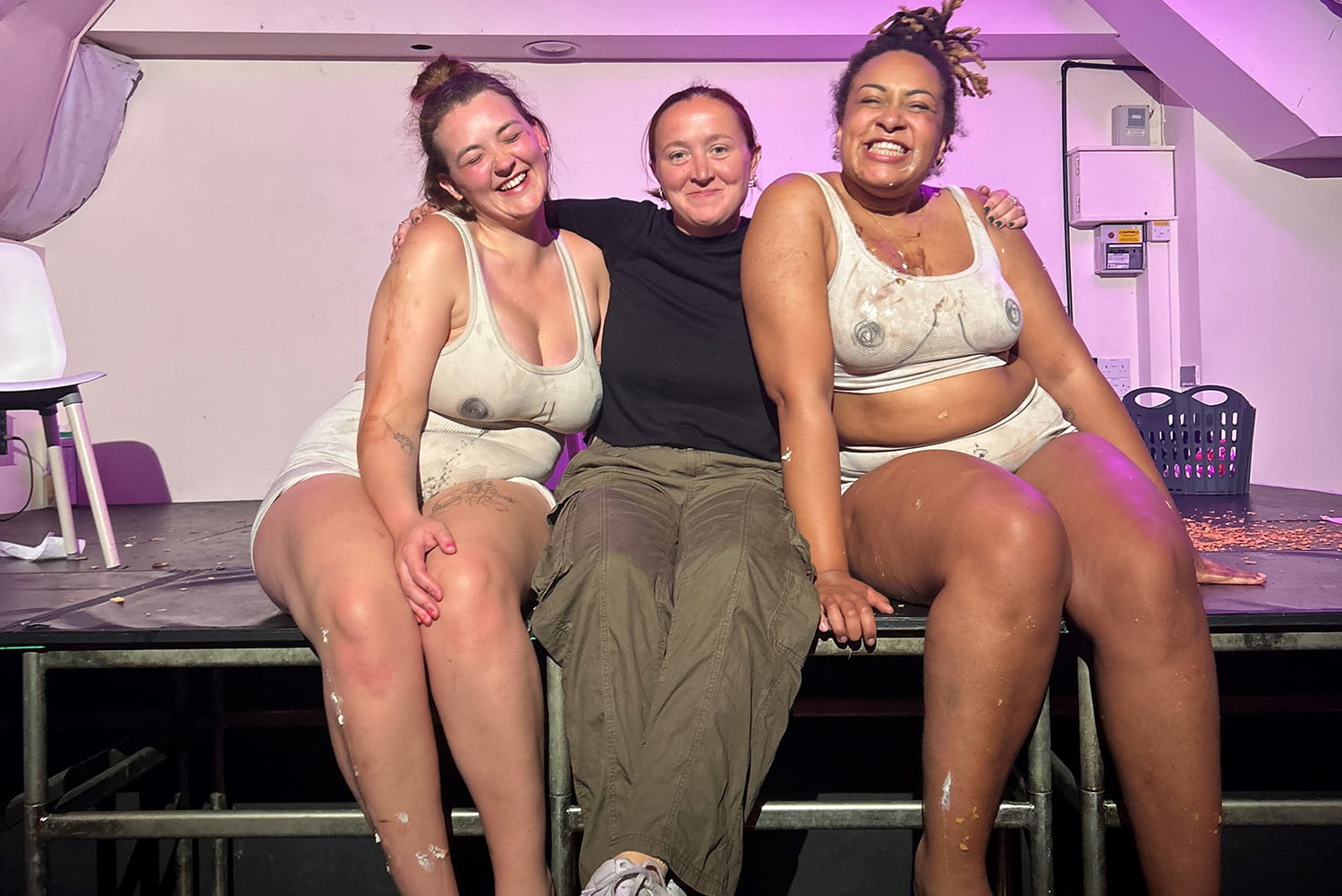From MA Theatre Studies to touring the UK: the Nasty girls reveal all

Amy Stephenson-Yankuba and Rio Montana Topley met at Essex where they both studied BA Drama and later, MA Theatre Practice. They are now the founding members of Succulent Theatre Company.
Amy and Rio spoke to us about their experience of Essex and beyond after the completion of their Spring 2024 tour of the UK with their show Nasty: ‘Big' Girls Being Gross, Mean and Sexy, which they started writing as part of their MA Theatre Practice dissertation.
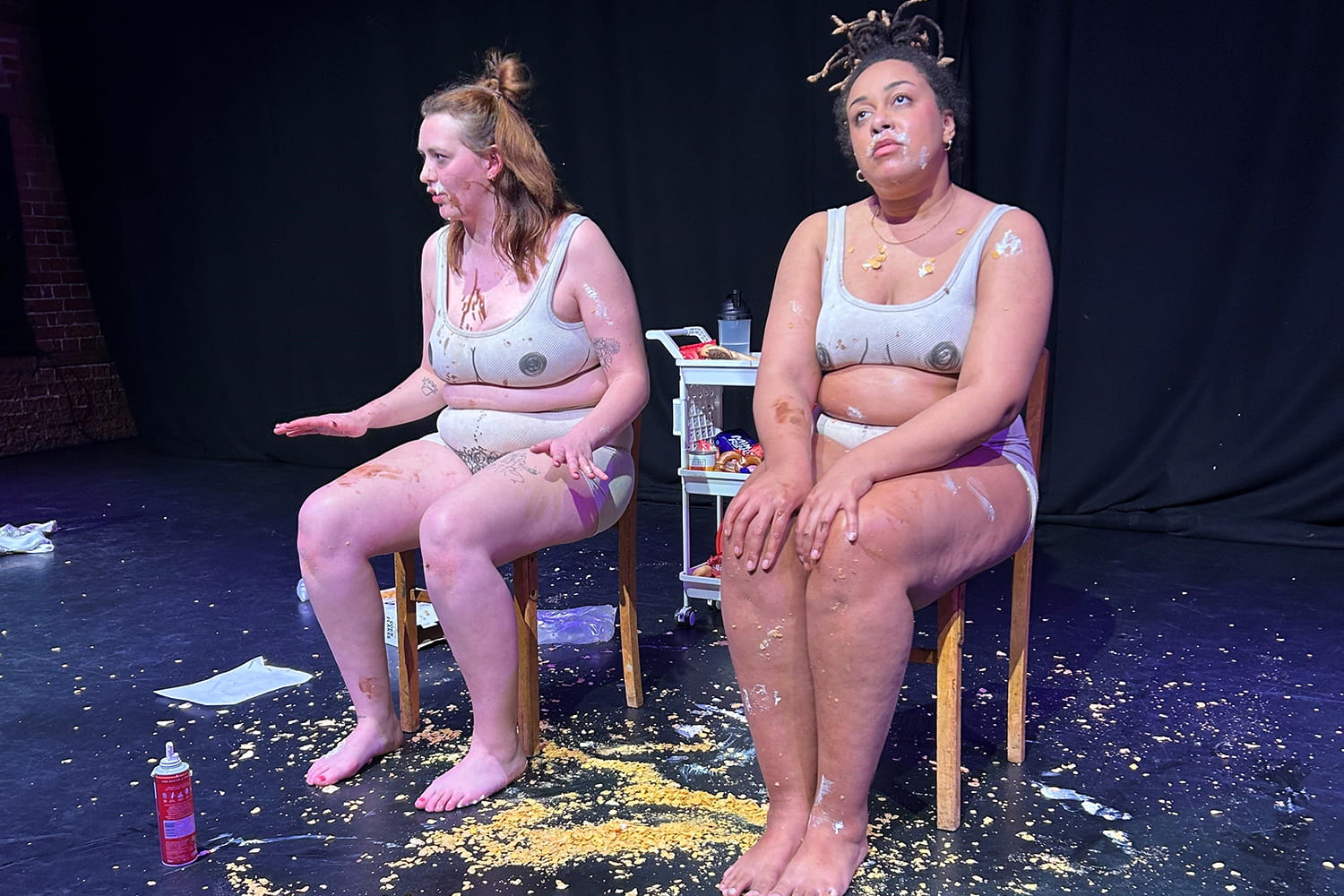
Why did you study drama at Essex?
Amy: I looked around Essex after I’d visited several other universities with big and flashy drama departments. They were nice, but the vibe wasn’t quite right. When I came to see Essex, the drama department felt like a little family and that was a real moment for me. Then, when I saw the summer sunsets in Colchester, I thought “this is the place for me”.
Rio: A girl from my Sixth Form College who was studying drama at Essex at the time came back to do a drama workshop with us, which was amazing! She was just raving about how amazing it was and about the Theatre Arts Society, so I applied!
I loved the entire hustle and bustle of the campus when I visited at an Open Day. Everyone was saying hello to each other and seemed to know one another. It seemed so friendly and lovely. I loved the course because all the teachers and past students were passionate and seemed to really enjoy it! The course looked practical and interactive and the fact that there was a real theatre on campus was amazing.
I returned for my audition day, and I was so nervous. But it turned out to be a group audition, which I loved because it was different from the other universities that I was considering. It seemed so relaxed, and it took the pressure off.
Why did you stay for MA Theatre Practice?
Rio: I always thought I’d stay and do an MA, but and Amy was the opposite!
Amy: I needed to get on with my actual life - that's what I said to Rio at the time [Rio: Rude!]. She literally walked away from me in anger.
I am neurodiverse and I had never considered that a postgraduate degree was for me because a learning experience that was completely led by me was terrifying, I had no idea how I would manage my time. But after exploring the concept of a taught masters and considering that I would be able to continue in the same department with the same learning environment with the added bonus that the people I love and have developed deep trust and good working relationships with would be there, I reconsidered. Why wouldn’t I do an MA? Why would I not extend this great experience and have an extra year and an even better qualification? It just made sense. The best decision I ever made.
Rio: At the time it was only the second year that MA Theatre Practice had been running, and we were friendly with some of the people on the first year of the course. It was so exciting to hear about everything that they were learning, and I liked that it was more independently led, but they were still very supported by the teaching staff.
We had created strong bonds with the people on our course and across the university and I believed that by continuing in such a supportive environment that the additional learning would work massively in our favour. I also wanted to stay in Colchester another year!
How have the skills that you gained from MA Theatre Practice helped you get to where you are today?
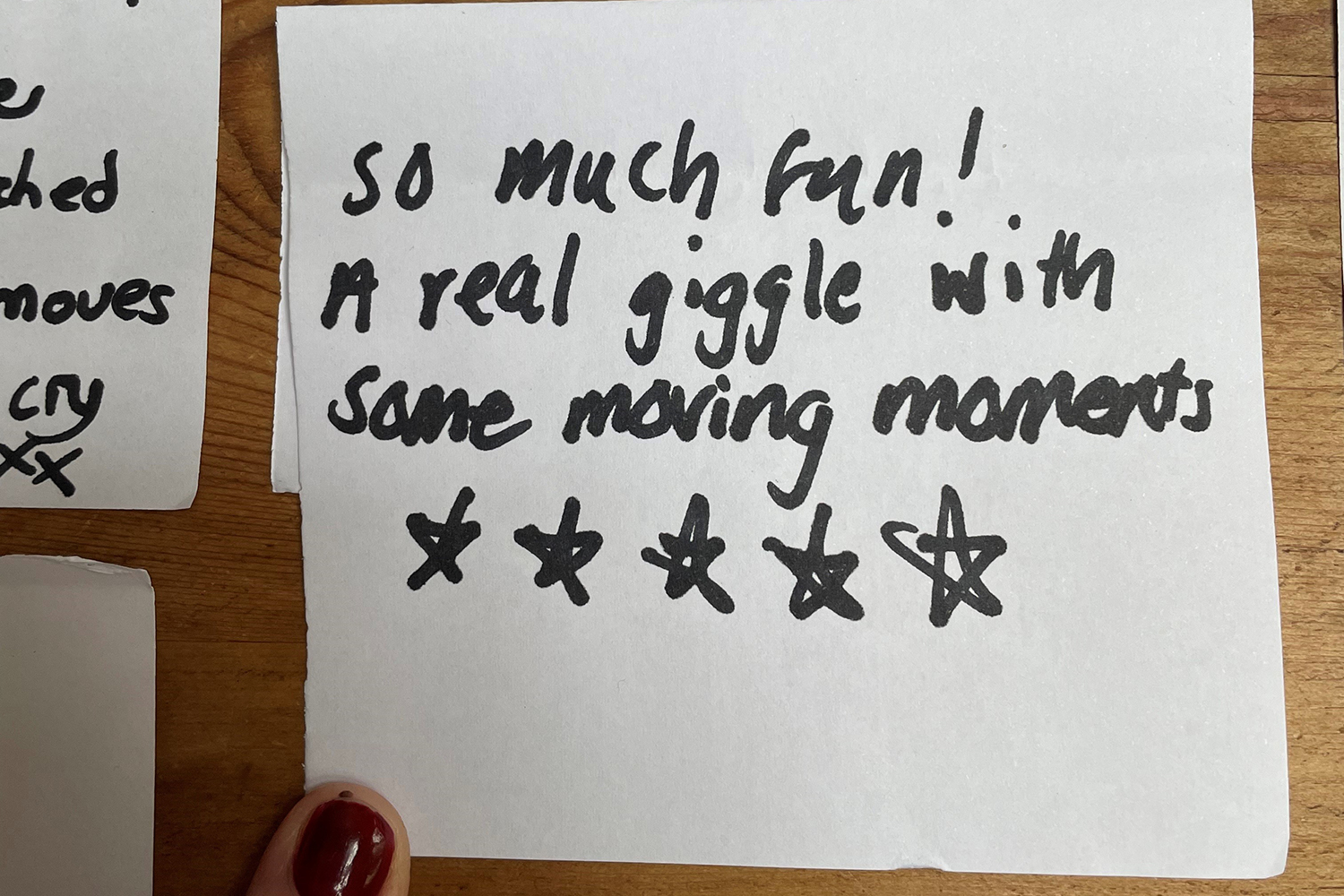
Rio: It taught me how to give and receive creative feedback. One module, which looked at how to write a script, explored how to make it readable and accessible and how to share your work with other creatives and give good feedback, but also how to accept negative feedback - that's something that I have always struggled with. The MA was a huge jump for me from an academic perspective, but learning how to give and receive creative feedback helped me to get to where we are now.
We learned how to do a tour budget! At the time I remember thinking that we're never going to need to do this again, but learning how to build a tour budget really helped us with the Nasty tour.
We owe a lot to our sessions with Jonathan Lichtenstein. He really helped Amy and I learn how to write from within ourselves, which has been invaluable to the creation of Nasty.
Amy: With Nasty, which was our MA final piece, it happened that because Covid hit right before we were supposed to perform it, we ended up using what we had learned on the MA to create what was essentially a tour pack.
We had a full script with links to sounds and lighting cues already there. It worked as a package to help us (and later venues) understand how the play went. There was more of a process, and there was a lot of scholarship behind it which meant that Nasty had lasting life.
It included all of the: What are we doing? Why are we doing this? Who are we? Who is it for? That we still use today. If you want to take something on tour, to take it from university and make sure it has merit in the real world, then a tour pack which answers those questions is invaluable for marketing purposes as well as for knowing why you are doing it and to help you convince other people to put your show on. That process was completely beneficial by accident.
How did you find having a theatre on campus?
Rio: Having a theatre on campus was so much fun. There were so many things to audition for, and you got to work with people who you wouldn’t have met otherwise. A lot of my friends from university are from shows that we did together.
Being involved with the Theatre Arts Society and Homegrown and going to the professional and student shows at the Lakeside Theatre gave you that opportunity to meet new people. We spent so much time at the theatre.
Through the Theatre Arts Society and Homegrown, you had the opportunity to do something that you wouldn't usually do, like, you could try at being the costume designer, or the set designer, or be a director.
I directed the Theatre Arts Society pantomime at the Lakeside one year, which was brilliant and I'm really happy that I got the opportunity, but it made me realise that I never want to direct anything ever again. Before that I was really interested in directing and had I not had that experience then I probably would have gone on to do actual directing and would have found out too late how much I hated it! The Lakeside Theatre gave you the opportunity to try out a variety of roles within the world of theatre.
Some modules took place in the Lakeside Theatre, and in our first year we learned about how to rig lights and set design, and sound design, and what the lights are called. Now that we are doing it professionally - which I hate saying, because I don't feel like that at all - but now to be able to use the correct technical language and know the equipment and the how it works to make creative decisions is just amazing. And then you would return in the evening and see a touring company perform at the Lakeside and you’d be able to recognise what they’d done and why on the same stage!
Amy: The tech side of learning offered through the Lakeside is incredible and has produced people like Tazi Amey (BA Drama) who is a professional Lighting Technician and Stage Manager and has her own theatre company, Aion Theatre, and Samuel Bell (MA Theatre Practice) who now works as Assistant Technical Manager at the Lakeside! These are people who love theatre but found ways they could specialise and train in other than being on the stage.
The university has given so many people the opportunity to train in all the different areas of theatre, and that is so important because there is no theatre without technicians and stage managers and lighting experts.
The traveling companies who performed at the Lakeside Theatre were so important to me. It was important for us to be able to see what theatre can look like. It was so varied, we saw performances where there were almost no words, or almost no action, and new writing. We got to see classics like Hedda Gabler streamed in from the National Theatre, but we also saw amazing live performances like Jess and Joe Forever with Nicola Coughlan!
Rio: Another thing that was amazing about the Lakeside Theatre, is that it gave me a job. I worked as a Marketing Assistant in my final year with the Comms team and that was good because it gave me another insight into theatre away from the stage. So many people that we knew at Uni worked as Front of House staff or in the bar. The Lakeside Theatre also offered a place to socialise and to relax, and that is completely unique and not something that every university has.
How did Nasty come about?
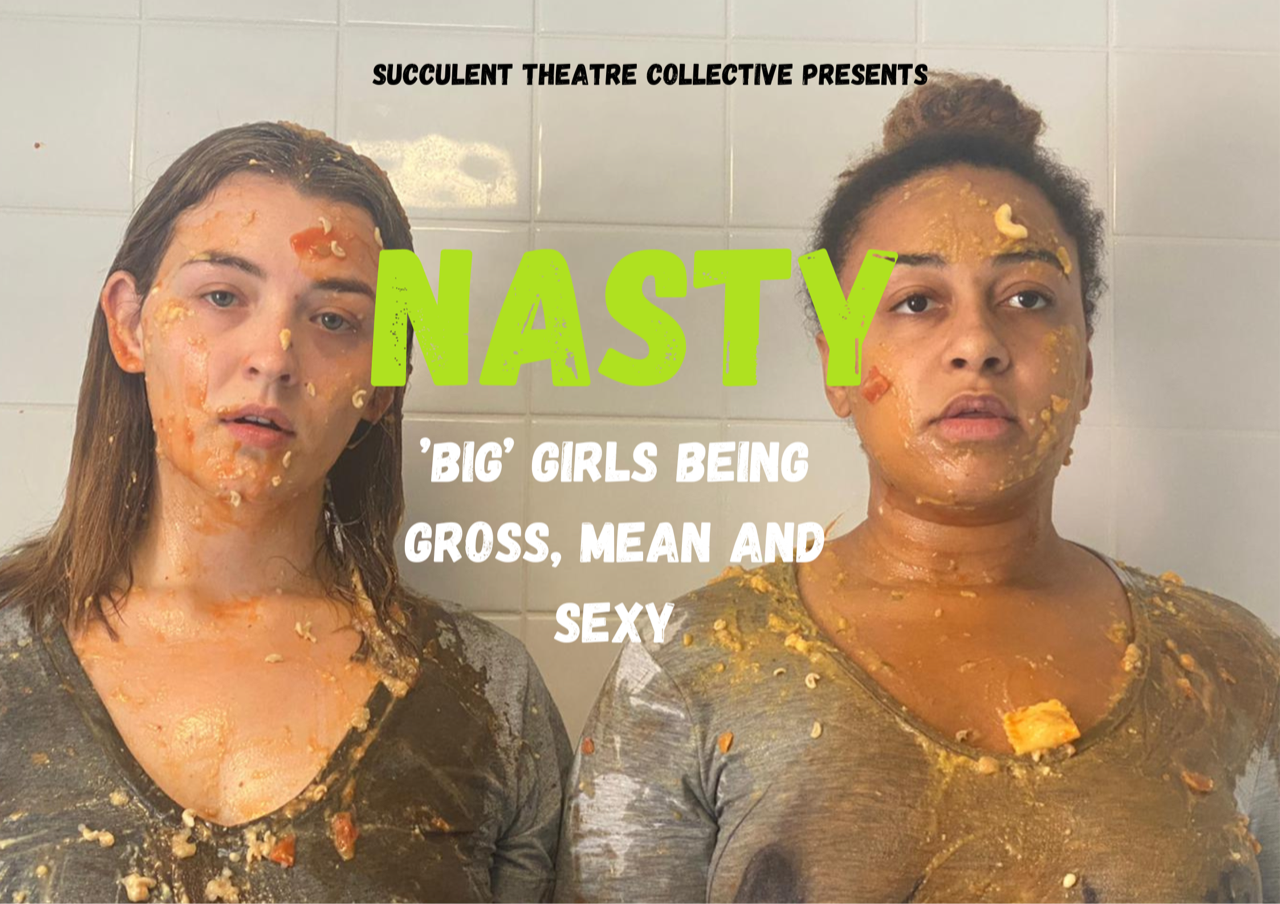
Rio: I always wanted to focus on or do something around body image and eating disorders. Speaking to Amy and having done a lot of work with her previously, I knew that she was interested in those subjects too, so we decided to do a joint final piece for our MA Theatre Practice.
We had learned about autobiographical and confessional theatre throughout the course, and we found that’s what we are good at and passionate about. The best way to make theatre, in my opinion, is to write about something that you are passionate about, and that you want to tell others about and then find form through the lens of your own eyes and experience.
It wasn’t easy but it did come quite naturally. We wanted to share our own experiences.
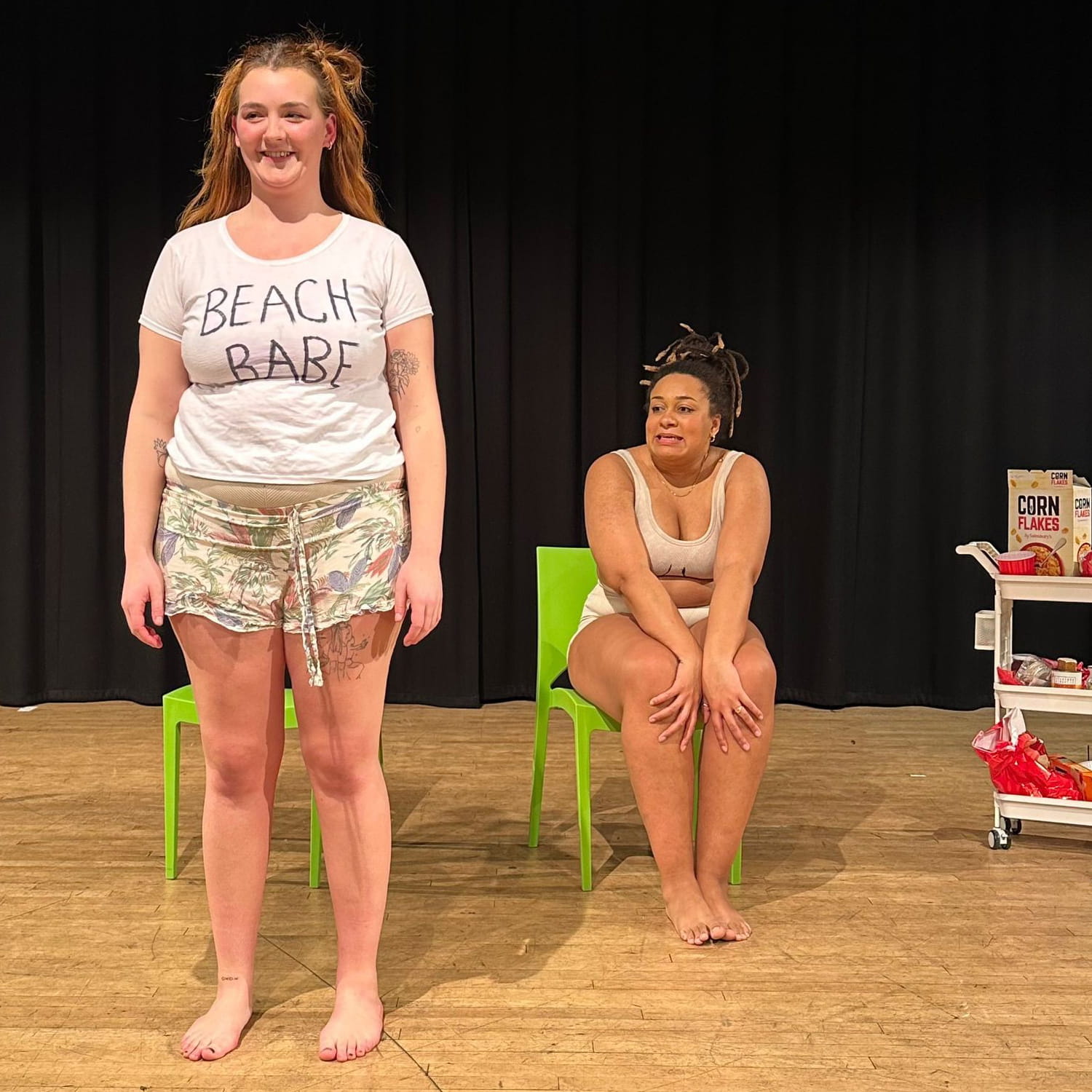
We're both big girls. We've both had eating disorders and issues with food, but if you were to look at us, you might not think that. With eating disorders, people and society expect you to be a certain way: you must be small. You even must be a tiny weight before you can get medical help. But if you are too small a weight then you can't get help either. It’s a very difficult experience and that’s what we wanted to share. We didn't see anyone else creating work about this topic with people who look like us. So, we thought, let's write it ourselves.
I wanted audiences to see our show and think: “I felt exactly like you felt. Thank you for making me feel seen.”
I wanted to be the voice who said: “Hello, hi! I feel the same way. Don't worry. You're not crazy. You're not on your own and things will get slightly better, not straight away, but they will.”
We came up with the idea for Nasty in my student house. We were sitting on my bed, and talking about all these awful, disgusting things that we did when we were growing up. We came to the realisation that we were really nasty! And then we had a revelation, “oh, Nasty!”
Amy: We were sitting in the Silberrad Student Centre talking about our experiences with eating disorders and Rio said about the first time that she made herself sick. We'd known each other for several years, and this was the first time we’d spoken about it, although it was such formative part of our experiences.
I remember thinking, how is this something that we are only just talking about now for the first time? Neither of us were ashamed of it, it just hadn't come up, and nobody would ever have asked us, because we don't look like we have an eating disorder.
Our joint BA dissertation piece felt like a culmination of all the things that we’d learned to that point, which was great because we created a piece about something we wanted to talk about. But with Nasty the process evolved.
The Sirens was an autobiographical storytelling piece, but with Nasty we wanted to make it not just about us, but about our audience too. Some feedback from The Sirens was that even though it was autobiographical, people felt seen and heard.
We wanted to build on that with Nasty and frame it around a message which explored the theme of what even is femininity. We wanted to explore questions like: why are we different? why are we nasty? Sometimes we are gross to ourselves, sometimes we do gross things. Are the things that we do feminine?
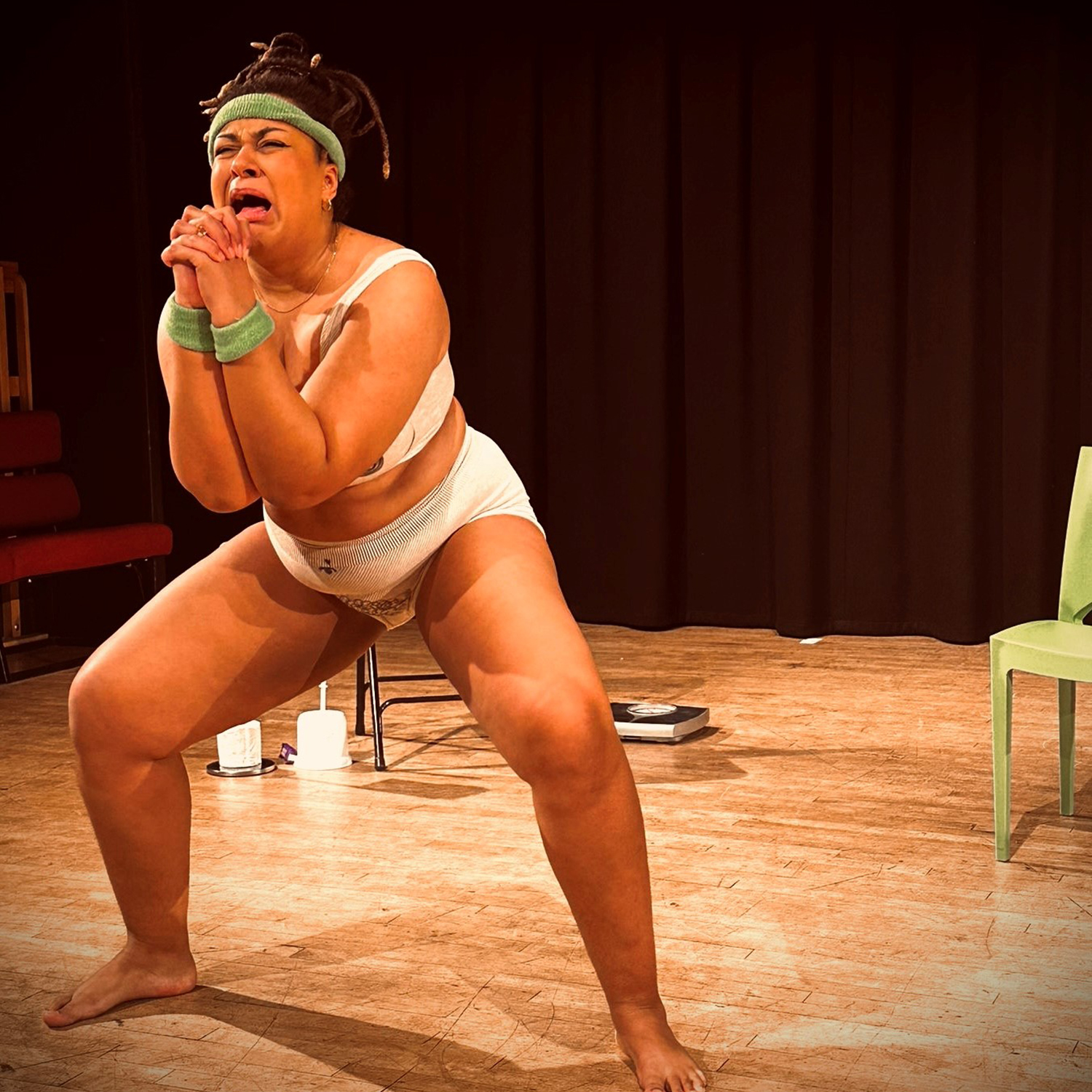
Nasty was a response to us feeling like we were not represented on stage. The drama department at the time was brilliant, but it was mostly white and female, and as a person of colour I felt like I couldn’t put on a show about black experiences or with back actors with lived guidance and support. I considered how I could put myself into a character that reflected me. And then I thought, I'll just play myself! I'll wrote myself into a character to share my story and my experience as a black person with an eating disorder.
Seeing yourself in theatre is important to me and I why we are so passionate about workshopping Nasty in schools. We tell kids in our workshops that YOUR story is important. YOU can be the star of the show. You don’t have to be the quirky best friend who falls in love with the white guy’s black best friend. YOU can be the protagonist.
What’s next for Succulent Theatre?
Amy: We’re working on our next show right now, it’s called Funeral Teeth and it's all about loss and grief, and it's going to premiere on 12 to 17 November at the Drayton Arms Theatre.
Rio: Come and see it!
